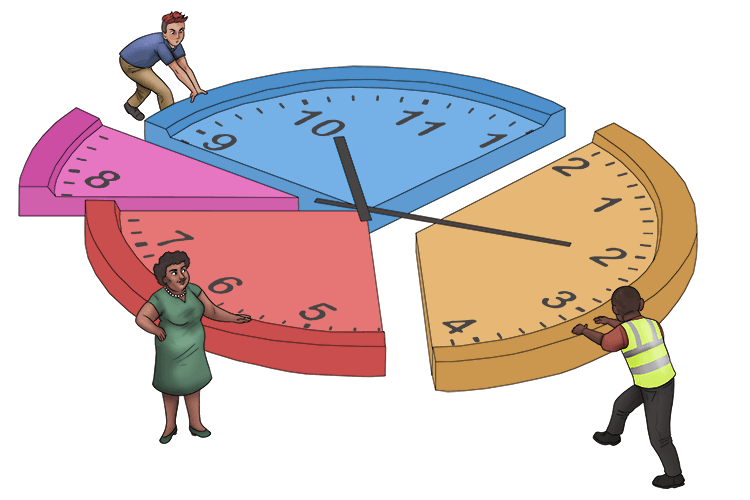Part Time Worker – Working only a proportion of full time hours
The meaning of part time is self explanatory. It's when an employee only works part of the time (part time) compared to a full time employee.

Working more than 35 hours per week, often spread over 5 days each week is referred to as full-time work. Anything less than this can be considered part-time work, but there is no specific or official number of hours that defines what part-time work is. In the UK, it is considered less than 35 hours but it varies from country to country. Anyone working in Germany less than 30 hours per week in considered a part-time employee.
Here in the UK, if your colleague works 7.5 hours per day, four days a week, then they are considered to be working part-time. If another work colleague works 5 days a week but only works in the mornings, 3 hours per day, you can consider them part-time as well.
Part-time work is becoming more common and companies have learnt to adapt and adjust to this so that they do not miss out on high-quality workers. They recognise that not all employees want full-time hours. Some companies are now offering job-sharing. Job-sharing is the process of literally dividing a job between two employees to cover one full-time role. This enables two employees to work part-time schedules.
Other companies who recognise the problems that parents have bringing up children employ some people only during school time, such as teaching assistants. This allows part-time working hours, not a full-time job, meaning they will be able to care for their children when out of school and on school holidays.
There are many reasons why people choose to work part-time, including:
- Work-life balance: Many prospective employees are looking for a work-life balance. This refers to maintaining a harmonious relationship between work and their personal life. Some people need part-time work to spend more time pursuing other activities or nurturing special projects like writing or singing. Some people are only looking for “gig work” in order to achieve this. The term is borrowed from the music industry where performers book “gigs” that are single or short-term engagements at various venues. People look at their career as a series of projects and experiences, as opposed to a long-term career at a given employer. They can choose when and where to work and on what. These people take jobs such as food delivery driver, pet sitter, freelancer, and bar work.
- Educational: Some employees may go part-time and only work four days a week in order to attend college, train in another field and eventually gain promotion through higher qualifications. Some full-time students take part-time evening work in restaurants or bars to supplement their overheads at university.
- Retirement transition: Instead of retiring and leaving the workforce altogether, a person may transition from working full-time to spending reduced hours working. They may do this to supplement their pension. Some people believe they remain more physically and socially active if working in some way, which maintains their mental well-being.
- Family commitments: Many parents choose jobs that allow them to work between school hours such as 9 until 3. This allows a parent to work and be able to complete the school runs of delivering and picking the kids up. Child care is an important aspect to consider for many people and part-time work gives them great opportunities.
- Opportunities: Some people take a part-time job in a company because it gives them an opportunity to get a full-time job. You are more likely to find out that a full-time vacancy is available in a company you want to work for if you are actually employed by them, even if it is just a few hours per week.
Benefits of hiring part-time workers include the fact that they can be brought in to work at the busiest times, improving customer service, but also able to reduce cost at non-peak times.
The disadvantages of employing part-time staff include the fact that the job sharers’ manager may have to spend more time supervising two workers instead of one. It could also be more expensive to train two people instead of one.
Rights
It’s important to note that by law part-time employees have the same statutory employment rights as other employees, whatever hours they regularly work.




